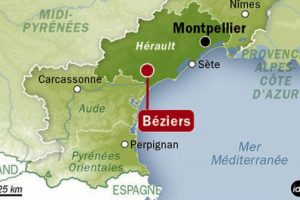I turned away from all of this news about Trump and his supporters condemning certain cities for their Democrat governors and mayors, and the poison of liberalism infecting those cities and their populations, and how the populations there, we are further assured, are terrorists, thugs, looters, . . . . to escape for a moment in medieval history and here is what I read:
Date: July, 1209

Place: Béziers (south France)
Author: Peter of les Vaux-de-Cernay, a monk and media apologist for the “State” powers
Topic: the troublesome inhabitants in southern France who opposed the natural and beneficial order of the Catholic Church
Extract from his tract. We begin with a wonderful city, a great city, but one “infected with a poison”:
Béziers was a most notable city, but entirely infected with the poison of heresy. Its citizens were not only heretics, they were robbers, lawbreakers, adulterers and thieves of the worst sort, brimful of every kind of sin. I hope it will not weary the reader if I give some examples of the evil ways of these people.
Of course. They are heretics; it is never enough to leave the account there. Heretics are by definition opposed to all that is good so anecdotal and true media bytes are routinely sought out to drive home the point:
[85] An example of brutality. One night just at daybreak a priest of the city was going to his church to celebrate the divine mysteries, carrying a chalice. Some of the citizens laid an ambush, seized him and beat him violently, breaking his arm and seriously wounding him. They took the chalice, disrobed him and urinated on him to show contempt for the body and blood of Jesus Christ.
[86] Another example. On another occasion, in the church of St Mary Magdalene in the city, the citizens in an act of dreadful treason killed their lord Raymond Trencavel Viscount of Béziers, and broke the teeth of their Bishop when he tried to defend the Viscount from their attack.
Isn’t that always how these things work? Nonconformists, outsiders, . . . it’s never enough to leave it at that, for powers that feel threatened by their existence. Character defects, pernicious motives, are assumed. Instances of wrong become the defining characterization of all.
And the mayor or equivalent of the city was a “do-nothing” heretic at that. He just let the heretics do as they wished, without restraint. He even went so far as to show solidarity with his citizens . . .
[88] To return to our main theme; before the crusaders arrived at Béziers, the Viscount of Béziers, Roger (of noble birth and a nephew of the Count of Toulouse, who was following his uncle’s evil example and was doing nothing to restrain the heretics), had promised the citizens of Béziers that he would not under any circumstances desert them, but would stand firmly by them to the death and would stay in the city to await the coming of Christ’s soldiers. . . .
The authorities gave fair warning to the people but they refused to comply. A show of force was necessary. Domination was necessary, a new type of army from the outside was brought in, and though it was a renegade group within that army who initiated hostilities, law and order was restored:
[90] Seeing this the servants of the army (who in the common tongue are called ribands) became extremely angry. They approached the city walls, and – without the knowledge of the chiefs of the army and quite without consulting them – mounted an attack. Astonishingly, they captured the city inside an hour. What more? They entered it immediately, killed almost all the inhabitants from the youngest to the oldest, and set fire to the city.
Peter. 1998. The History of the Albigensian Crusade: Peter of Les Vaux-De-Cernay’s Historia Albigensis. Translated by W. A Sibly and M. D Sibly. Woodbridge: Boydell.
If you enjoyed this post, please consider donating to Vridar. Thanks!


Are you saying, “There’s nothing new under the sun?”
What struck me was reading the way Christians of a different persuasion were framed as “heretic” by definition, and if opponents to the ruling doctrine, they were therefore simultaneously bad people, and incidents to support this view became the identifying marks of them all. Democrats and “liberals” are the opponents — they are a threat to the way of things therefore — they are thus bad, and any incident of bad will become part of the frame in which all of them are defined.
Then I recalled the way dissidents, religious and political, are more generally framed. They are not merely of a different opinion: their different opinion is a sign they are also bad people. Compare the way mainstream biblical scholars have all too often labelled those challenging the status quo, the conventional wisdom. Recall the treatment of Thomas L. Thompson and then other “minimalist”. Then recall the treatment of those questioning the historicity of Jesus. It is not enough that they present a view that challenges the established one. No, they must also be branded as “pretenders” and of sinister intent and ignorance and foolishness, and speaking out of turn and above themselves. They become not just people with a different view, but they become “bad” people…
People who are excommunicated from a church or cult over doctrinal differences or other positions of disagreement are necessarily also portrayed as “in the bond of Satan” — and all sorts of character flaws are imputed to them.
The way political opponents are being framed by many today is the same. Incidents of lawlessness are taken as signs of the character and mindset of the whole. It is so easy to do because those who do not tow the party line are “heretics” — “liberals”…
“The way political opponents are being framed by many today is the same.” So stated, I could not agree more. But if I were to offer evidence, it would not come only from the conservative commentariat. The tendency to demonize one’s ideological adversaries is a characteristic of neither liberal nor conservative thinking. It is a characteristic of human nature, to which no political philosophy has developed any immunity yet.
I am fresh under the influence of Ornstein and Mann’s It’s Even Worse Than It Looks in which they remind us that political debate in the U.S. has not always been like it is today. The U.S. system can only work if individuals in both major parties are willing to talk and compromise to reach agreements. That is what has broken down to a significant extent. It’s been eroding for some decades but seems now to be at a real impasse.
We like to think our political leaders can do better. We have a right to expect better from academics, too.